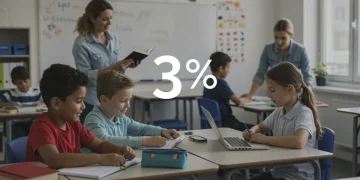The influence of social media algorithms on public opinion

The influence of social media algorithms on public opinion shapes what users see online, directing their perceptions and interactions based on engagement and personal preferences.
The influence of social media algorithms on public opinion is more profound than we often realize. These algorithms filter what we see online, affecting our perceptions and beliefs. Ever wondered how your feed reflects your views?
Understanding social media algorithms
Understanding social media algorithms is crucial in today’s digital world. These algorithms determine what content you see when you scroll through your feed.
Social media platforms use complex formulas to decide which posts appear first. This process can greatly influence your opinions and perceptions. By prioritizing content that engages you, these algorithms can curate an experience that may reinforce your existing beliefs.
How Algorithms Operate
Algorithms analyze users’ behavior to serve tailored content. They consider your likes, shares, and the time spent on posts. This personalization makes your social media experience unique.
Key Factors Influencing Algorithms
- The level of engagement on a post
- Your past interactions with similar content
- The popularity of the post among other users
- Recency of the content
These elements play a significant role in shaping your daily social media experience. For instance, if you frequently engage with political content, you may start seeing more posts that align with your political beliefs. This can create a filter bubble, limiting your exposure to diverse viewpoints.
The Effect on User Behavior
The influence of these algorithms isn’t just about what you see; it also affects how you interact. When users engage with certain types of content, they often receive more of that same content. This cycle can exacerbate echo chambers, where differing opinions are rarely encountered. As a result, social media can inadvertently shape our beliefs and understanding of the world around us.
Understanding social media algorithms is essential to becoming a more informed user. By recognizing how these systems function, you can make conscious choices about your social media consumption and seek diverse perspectives.
How algorithms shape our feed
The way algorithms shape our feed has a big impact on what we see every day. These algorithms are designed to show you content that keeps you engaged, often reflecting your preferences.
When you like or share a post, the algorithm takes note. It then recommends similar content, creating a personalized experience tailored just for you.
The Personalization Process
Your social media feed gets shaped by several factors. Each platform uses algorithms to analyze your activities, such as:
- The types of content you interact with
- Your engagement history, including likes and comments
- Time spent viewing specific posts
- Interactions with friends and accounts you follow
These factors help platforms understand your interests and preferences, allowing them to prioritize posts you are likely to engage with more. This can lead to a cycle that reinforces your existing beliefs.
Implications of Tailored Feeds
When your feed is curated based on your behaviors, it can affect how you perceive the world. For instance, seeing content that aligns with your opinions can limit exposure to diverse viewpoints. In this way, algorithms can contribute to the creation of echo chambers.
How algorithms shape our feed plays a crucial role in your online experience. By personalizing your content, these algorithms create a unique environment that keeps you engaged but may also narrow your perspectives.
Impact on public perception and opinion

The impact of social media algorithms on public perception and opinion is profound. These algorithms can shape our understanding of events and issues by filtering the information we see daily.
When social media platforms prioritize certain content, they influence what users are exposed to. This exposure can significantly affect group attitudes and social norms, leading to shifts in public opinion over time.
How Algorithms Influence Perception
Algorithms do not just organize information; they can also manipulate it. They decide which posts you see based on:
- Your engagement history
- The popularity of the content among other users
- Trends within your social circle
- The recency of the posts
These factors create a tailored experience that can elevate specific voices while silencing others, impacting society’s collective viewpoint.
The Role of Echo Chambers
As algorithms curate what we see, they can contribute to echo chambers. These are environments where users primarily encounter information that aligns with their existing beliefs. When users are surrounded by similar views, they may become less open to opposing opinions.
This dynamic is essential to understand because it illustrates how powerful social media platforms are in shaping cultural and political landscapes. As public perception becomes increasingly influenced by tailored content, users must be aware of how their information sources can affect their views and decisions.
Engaging critically with content and seeking diverse perspectives can help counterbalance the effects of these algorithms. By doing so, users maintain a more rounded and informed perspective.
Case studies of algorithm influence
Case studies of algorithm influence reveal how deeply social media platforms can impact user behavior and broader social dynamics. These examples help clarify the effects of algorithms in real-world scenarios.
For instance, during election periods, social media algorithms often prioritize content that drives engagement. This means that posts with sensational or polarizing information may receive more visibility than those that are factual but less engaging.
Example 1: The 2016 U.S. Presidential Election
In the 2016 U.S. Presidential Election, algorithms played a significant role in shaping voter opinions. Research showed that users were often exposed to biased content that aligned with their views.
The algorithms favored posts that prompted strong emotional responses. As a result, misinformation spread rapidly, affecting how individuals perceived candidates and their policies.
Example 2: The COVID-19 Pandemic
During the COVID-19 pandemic, social media algorithms also impacted public health communication. Misinformation about the virus and vaccines proliferated on various platforms. In this case, algorithms amplified sensational posts, overshadowing accurate information from health experts.
- Algorithms prioritized engagement over factual content.
- Users often shared sensational posts without verifying the information.
- This led to widespread confusion and misinformation.
- Health organizations struggled to ensure that accurate information reached the public.
These case studies underline just how significant the influence of algorithms can be in critical societal issues. They show that the content users see is not just a neutral reflection of their interests but rather a powerful force that can shape opinions and behaviors.
Future trends of social media algorithms
Future trends of social media algorithms are shaping the way we interact with content online. As technology advances, algorithms are expected to become more sophisticated, personalizing user experiences even further.
One significant trend is the increasing use of artificial intelligence (AI) to improve content curation. AI can analyze data at an unprecedented scale, making it possible for algorithms to understand users on a deeper level.
Enhanced Personalization
As algorithms evolve, users can expect even more tailored content. By leveraging data from various sources, algorithms will be able to:
- Analyze user behavior across different platforms.
- Predict future interests based on past interactions.
- Adjust content in real time according to current trends.
This enhanced personalization can lead to a more engaging online experience, but it may also increase concerns about privacy and data security.
Increased Regulation
With growing awareness of the power of algorithms, more voices are calling for regulation. Governments and organizations are beginning to push for transparency in how these systems operate. There may be:
- Mandates for platforms to reveal how algorithms curate content.
- Guidelines to prevent the spread of misinformation.
- Measures to ensure diversity in content exposure.
As regulations come into play, social media platforms will have to adapt their algorithms to comply with new standards.
The shifting landscape of algorithms will require users to stay informed. Understanding how these systems work is essential for navigating the digital world safely and effectively. Being aware of the future trends of social media algorithms can help users make conscious choices about their online interactions.
FAQ – Frequently Asked Questions about Social Media Algorithms
How do social media algorithms affect what I see?
Social media algorithms determine the content shown on your feed based on your interactions, preferences, and trends, tailoring your experience.
Can algorithms create echo chambers?
Yes, algorithms can promote content that aligns with your existing beliefs, leading to echo chambers where opposing views are less visible.
What are the risks of algorithm-driven content?
The main risks include exposure to misinformation and a limited understanding of diverse perspectives, as algorithms often prioritize engagement over accuracy.
How can I ensure I see a variety of content online?
You can follow different accounts, engage with various topics, and actively seek out diverse viewpoints to counteract algorithmic filtering.






